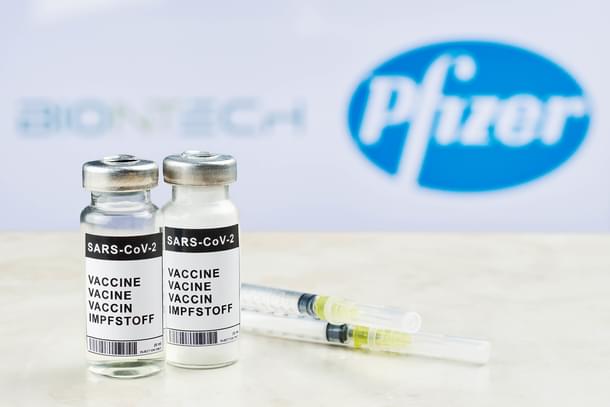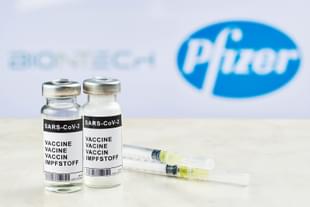Ideas
Pfizer Vaccine And Challenges Linked To Its Rollout In India
Bhaswati Guha Majumder
May 05, 2021, 07:05 PM | Updated 07:05 PM IST
Save & read from anywhere!
Bookmark stories for easy access on any device or the Swarajya app.


In India, as of now, over 15 crore people have received Bharat Biotech’s Covaxin and Serum Institute of India’s (SII) Covishield.
Meanwhile, the country has received 150,000 doses of Russia's Sputnik V Covid-19 vaccine on 1 May, and the government said "millions of doses" more will come in.
On 3 May, the American drug-maker Pfizer, which developed an mRNA vaccine along with its German partner BioNTech, said that the company was in discussions with the Indian government seeking an "expedited approval pathway" for its Covid-19 jab.
As reported by Reuters, Pfizer chief executive officer Albert Bourla said: "Unfortunately, our vaccine is not registered in India although our application was submitted months ago."
Many people have raised questions regarding not approving an already tested and reliable vaccine at a time when India needs it the most. But the fact is that there are some challenges related to the Pfizer vaccine roll out in India that cannot be overlooked.
Challenges Ahead
Last year, after the Pfizer vaccine was proven to be safe and more than 90 per cent effective against the coronavirus caused disease, NITI Aayog member Dr V K Pau, who is also the head of India’s Covid-19 task force said sufficient doses of the Pfizer-BioNTech vaccine, as required for the Indian population, will not be available but the government was looking at the possibilities.
"The arrangement of cold-chains for storing the vaccine developed by Pfizer at a low temperature of -70 degrees Celsius is a big challenge and it will not be easy for any nation,” he added, according to a report by the Times of India.
Recently, a Twitter user who goes by the name Suraj (@surajbrf) has also explained several issues related to the Pfizer vaccine.
In a Twitter thread, he echoed the same concern related to the storage and wrote: “The vaccine must be stored at -60 to -80C, i.e. ultra-low temperature (ULT), much colder than normal freezer (-20C) or fridge (2 to 8C). Such storage systems are costly but the cost depends on capacity. These have alarm systems to notify of failure or temperature fluctuations.”
The vaccine would also require a deep freeze delivery chain that is believed to be complicated and costly.
In case of sending the vaccine doses to a destination county, the jabs should be in special dry ice packs, each holding up to 50,000 doses.
After the vaccines are delivered the destination country can choose to store the jabs in a “freezer farm” for a maximum of six months at -70 degree Celsius.
The unopened dry ice packs with the vaccines then have 10 days to reach the inoculation centre. Once delivered, the jabs can be stored for up to five days in a fridge with a temperature between 2 and 8 degrees Celsius.
But once opened, each vial — 5-6 doses — must be administered within 6 hours and must be mixed with saline diluent beforehand.
Additionally, the Twitter user said the contents of each transport box must be moved into ultra-low temperature storage in 2-5 minutes to ensure that vaccines don’t get too warm or too cold — which makes the transportation complicated.
“A major hospital could hold several boxes worth of doses, but the ULT freezers cost between 3-5 lakh (pretax) for small ones, up to 25 lakh for ~800L Stirling Ultracold freezers suited to large storage nodes,” he said while highlighting the fact that the ULT freezers have high operating cost and require stable power.
However, the US Food and Drug Administration (FDA) clarified in a February report that undiluted Pfizer vaccine vials can be held at standard pharmacy freezer temperatures — between -13 and 5 degrees Fahrenheit — the maximum for two weeks after they arrive at a vaccination site.
But if the vaccines are held for more than two weeks, they need to stay in much colder freezers with temperatures below -78 degrees Fahrenheit.
FDA’s comment came after Pfizer discovered that the vaccine stays effective at normal freezer temperatures.
Bourla appreciated the collaboration with the FDA and the centres for Disease Control and Prevention as the agencies work to ensure that the vaccine can be shipped and stored under increasingly flexible conditions.
“If approved, this new storage option would offer pharmacies and vaccination centres greater flexibility in how they manage their vaccine supply," said the Pfizer chief executive officer.
Transportation, Availability And Cost
However, Dr Kate O'Brien, Director of WHO's Department of Immunization, Vaccines and Biologicals, said that transporting and distributing those jabs would be a struggle, “frankly, in every country”.
Echoing a similar concern, Suraj wrote on Twitter that even though the cold transport box looks small, they are heavy.
The American drug-makers developed a special transport box for the vaccine delivery and that size is equivalent to a suitcase that includes GPS trackers.
There is also a need for refrigerated trucks which would take the vaccine doses from airports to respective sites.
These trucks are built to keep contents frozen or chilled. Such vehicles can carry fresh produce, medicine, ice cream, fish or meat and the temperature inside can be set as low as -10 degrees Celsius to -15 degrees Celsius.
Additionally, vaccine transport by air is restricted in volume by the Federal Aviation Administration guidelines on dry ice transport.
As per the Twitter thread, the current limit is 15,000lb, which translates to at most 1 million doses each Boeing 777 flight.
Typical air transport is around 3 to 5 lakh doses per flight, said the Twitter user adding that “This is how much Japan and Israel get per delivery since not all countries allow much dry ice transport, which poses a cabin pressure risk from dry ice sublimation.”
A flight carried about as much as a freezer trailer truck — which means that the destination place will be significantly costlier per vaccine dose.
“This is why Pfizer orders have been focused on North America and European Union and the United Kingdom- local mfg + truck delivery,” the Twitter thread added.
But Suraj has stressed on the fact that this transportation strategy won’t work in India.
Pfizer’s goal is to produce between 2.3 and 2.4 billion doses in 2021. But most of the vaccine doses are already reserved by other nations.
As reported earlier, the US which has a population of around 330 million has locked up a deal with Pfizer to buy 100 million doses of vaccine, while the EU has booked 200 million doses for its about 450 million people.
Even Israel, which is the most vaccinated country in the world, signed a deal to buy millions of doses of the Covid-19 vaccine from Pfizer through 2022.
So, for India, the availability of Pfizer-BioNTech jab will take time.
“At current production volume, Pfizer cannot supply more than 3 per cent of weekly vaccination rate in India recently, even with weekly 5L shipments like Israel,” wrote the Twitter user.
Recently various sources have pitched the Pfizer vaccine for India. This parlays the recent western âbrandingâ effort differentiating Pfizer, but it is known that this vaccine has some unique technical requirements.
— Suraj (@surajbrf) May 5, 2021
This thread analyzes the Pfizer logistics in depth.
1/
In the case of cost, the Pfizer vaccine is one of the costliest in the market.
As per recent reports, the EU was negotiating the new contract for $23.22 (Rs 1,717.34) per Pfizer vaccine dose.
The Times of Israel reported that Israel has paid $23.5 (Rs 1,737.93) per Pfizer-BioNTech vaccine dose, but also noted that the cost may have been much higher.
In India, currently, Covishield — the Oxford-AstraZeneca vaccine manufactured by SII — is priced at Rs 150 a dose for the Centre, Rs 300 a dose for state governments, and Rs 600 a dose for private hospitals.
Bharat Biotech has fixed the price of Covaxin at Rs 600 per dose for state governments and at Rs 1,200 per dose for private hospitals and Rs 150 for Centre.
On 1 May, the first consignment of the Sputnik V vaccine — 1.5 lakh doses — arrived in India.
Even though many details of Sputnik V’s price is about to be disclosed, previous indications suggested a per-dose price of Rs 750.
Considering all these issues, in a current scenario, India may have to pass on Pfizer-BioNTech vaccine and look for other options.





